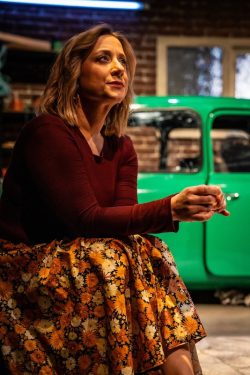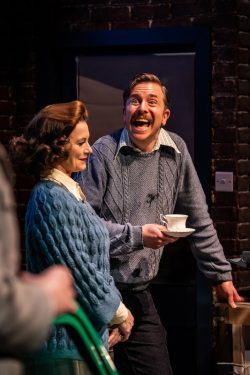 LIKE most of Alan Ayckbourn’s 90-plus professionally presented plays, Just Between Ourselves started life at the Stephen Joseph Theatre, Scarborough, before going out on tour, with the author in tow continually tweaking the text, before finding its way onto London’s West End stage.
LIKE most of Alan Ayckbourn’s 90-plus professionally presented plays, Just Between Ourselves started life at the Stephen Joseph Theatre, Scarborough, before going out on tour, with the author in tow continually tweaking the text, before finding its way onto London’s West End stage.
I caught up with Alan Ayckbourn in Bridgwater Arts Centre when, in 1975, this play was in the middle of its pre-London tour. Sitting besides the then Morris 1000 (in the present production an Austin Mini replaces its Morris cousin), which had been cut into four sections in order to get it into small spaces like the Arts Centre and then bolted back together, this quiet, diffident man answered my questions in the same thoughtful, but never flamboyant, style of many of his characters.
There are reflections of that man in many of his characters and echoes of his own somewhat mixed family background. Here the pressures on a man and woman when they are joined in holy matrimony are put under the microscope. These are pressures that were very different in the mid-1970s from those facing newly weds in 2025.
We do not know what brought together the nervy Vera (Holly Smith) and Dennis (Tom Richardson), hiding in a world where he spends most of his time in his garage making useless, mainly inefficient gadgets. Nor, similarly, do we know what united their new friends, the indecisive Neil (Joseph Clowser), desperate to prove that he is the breadwinner in the family, and Pam (Helen Phillips), an independent young woman, ahead of her time. When we meet them, their marriages are definitely on shaky ground.
Between Dennis believing that all his wife’s problems are laughable quirks of nature, and the continual sniping of his possessive mother Marjorie (Connie Walker), Vera is doomed to sink deeper and deeper into a depression that will eventually leave her locked into a silent world where she no longer reacts to any stimulus.
 Only Pam can see the reasons for Vera’s malady, but faced with bridge-building with her ineffectual husband, she either does not have the strength or will power to attempt to help Vera back into reality.
Only Pam can see the reasons for Vera’s malady, but faced with bridge-building with her ineffectual husband, she either does not have the strength or will power to attempt to help Vera back into reality.
The action is set mainly in Dennis’s chaotic garage, a jumble of gadgets and lights, dominated by Vera’s splendid green Mini, which Neil wants to buy for Pam in order to cement his position as head of the family – while she wants to buy it for herself to show her independence. The other scenes set in the garden would have benefitted from some tighter lighting helping to isolate the action from the garage set which is still clearly visible behind.
Society’s views on mental health and the shared responsibilities between husband and wife have changed enormously in the 50 years since this play was written, so it must now be regarded as a period piece. Those changes have also taken the edge off some of Alan Ayckbourn’s delicious comedy for, like all of his plays, no matter how serious and thought-provoking some of the story might be, they are laced through and through with golden veins of wonderful comedy.
After London Classic Theatre’s production leaves Bath Theatre Royal, it sets out on a wide-ranging tour that brings it back to the Brewhouse in Taunton on 1st and 2nd July, and Everyman Theatre, Cheltenham, between 8th and 12th July.
Photographs by Will Green Photography.